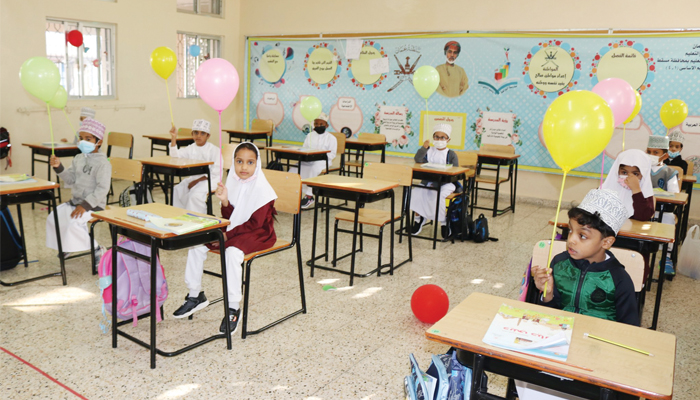
Muscat: Children aged up to 11 are exempt from wearing masks while at school, the Ministry of Health said on Wednesday.
The decision comes days after children in grades one, four, five, nine and 11 were allowed to return to school. This development was communicated to the Ministry of Education, in keeping with guidelines drafted by the World Health Organization, for school-going children up to age 11.
However, other precautionary measures in place to protect students and staff in schools must be adhered to, the ministry warned.
“Children aged five years and under should not be required to wear masks, while children aged 12 and over should wear a mask and follow the same precautionary conditions as adults,” said the Ministry of Health statement.
Shedding further light on this decision, an official from the Ministry of Health told the Times of Oman that children aged 11 and under might not have the maturity to properly handle their masks, which could lead to more infection to themselves and others.
“You may be wondering why students between six and 11 years of age do not have to wear a mask, except under certain circumstances,” he said. “We consider those under 11 years to still be unaware, and they might not know how to use masks. The student may exchange the mask with his classmates or schoolmates, or wear it once again after it falls on the ground,” he added.
“He might wear it after it has gotten dirty or wet, and all of these will help spread infection among the students or cause them to have respiratory problems.”
“However, children aged between six and 11 years should wear masks, based on whether there is widespread transmission where the child resides, and the ability of the child to safely and appropriately use a mask. These conditions also depend on “easy access to masks, readily available replacement masks, and adequate adult supervision, so that children know how to put on, take off and safely wear masks. Another factor is the interactions the child has with people who are at high risk of contracting serious illnesses, such as the elderly and those with existing health conditions.”
Explaining why mask wearing was compulsory for students above 12, he added, “Children aged 12 and over should wear a mask under the same conditions as adults because we see them as adults, and they know how to follow the precautionary measures carefully. They are aware of the above dangers, so it is possible to say they can be relied upon to wear and use the masks in the right manner.”
Committees made up of officials from the directorates of health and education have been set up in each governorate at the school level to ensure schoolchildren, teachers and staff wear their masks properly. Instructions on how to wear masks properly have been distributed to schools in all parts of the country.
“Wearing a mask is stipulated in the health procedure document approved by the Ministry of Education, in coordination with the Ministry of Health,” said a representative from the Ministry of Education. “This document contains the procedures students must follow from the moment they leave home to go to school, until their return. This includes their time on the bus, as well as the procedures bus drivers should follow, such as measuring students’ temperature when they get on the bus, and make sure they wear masks,” he explained. “These must be repeated when students enter the schools.”
Students whose temperatures are high will not be allowed to enter the school premises. Those who don’t have a mask, or are carrying one that is torn or damaged, will be provided one at the school entrance. Should a student’s mask also get damaged while he/she is at school, staff will provide him/her with another one. Both students and teachers are required to wear their masks while in class.
“There is awareness among the faculty students on the importance of adhering to precautionary measures, including wearing a mask, washing hands, maintaining a distance of two metres, the importance of students avoiding going to school if they suffer from respiratory symptoms or a high temperature, and others,” he explained.
The ministry official went on to add, “We have also explained to students when and how they need to wear a mask, how to prevent it from getting wet or dirty, and the harm of exchanging masks with classmates and schoolmates, or while on the bus.”